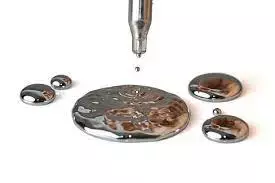- Home
- Medical news & Guidelines
- Anesthesiology
- Cardiology and CTVS
- Critical Care
- Dentistry
- Dermatology
- Diabetes and Endocrinology
- ENT
- Gastroenterology
- Medicine
- Nephrology
- Neurology
- Obstretics-Gynaecology
- Oncology
- Ophthalmology
- Orthopaedics
- Pediatrics-Neonatology
- Psychiatry
- Pulmonology
- Radiology
- Surgery
- Urology
- Laboratory Medicine
- Diet
- Nursing
- Paramedical
- Physiotherapy
- Health news
- Fact Check
- Bone Health Fact Check
- Brain Health Fact Check
- Cancer Related Fact Check
- Child Care Fact Check
- Dental and oral health fact check
- Diabetes and metabolic health fact check
- Diet and Nutrition Fact Check
- Eye and ENT Care Fact Check
- Fitness fact check
- Gut health fact check
- Heart health fact check
- Kidney health fact check
- Medical education fact check
- Men's health fact check
- Respiratory fact check
- Skin and hair care fact check
- Vaccine and Immunization fact check
- Women's health fact check
- AYUSH
- State News
- Andaman and Nicobar Islands
- Andhra Pradesh
- Arunachal Pradesh
- Assam
- Bihar
- Chandigarh
- Chattisgarh
- Dadra and Nagar Haveli
- Daman and Diu
- Delhi
- Goa
- Gujarat
- Haryana
- Himachal Pradesh
- Jammu & Kashmir
- Jharkhand
- Karnataka
- Kerala
- Ladakh
- Lakshadweep
- Madhya Pradesh
- Maharashtra
- Manipur
- Meghalaya
- Mizoram
- Nagaland
- Odisha
- Puducherry
- Punjab
- Rajasthan
- Sikkim
- Tamil Nadu
- Telangana
- Tripura
- Uttar Pradesh
- Uttrakhand
- West Bengal
- Medical Education
- Industry
DMPS useful challenge test for monitoring mercury vapour exposure among dental personnel

Mercury is an element which, with its compounds, is hazardous and is found in hazardous wastes. Alternative test systems and suitable diagnostic and therapeutic agents have been developed to detect mercury exposure.
DMPS-mercury challenge test is useful for monitoring mercury vapour exposure among dental personnel, according to a recent study published in the Journal of Pharmacology and Experimental Therapeutics.
Monterrey, Mexico, the sodium salt of 2,3-dimercaptopropane-1-sulfonic acid (DMPS) challenge test (300 mg p.o. after an 11-hr fast) was given to dental and nondental personnel. Urine samples were collected and analyzed for total mercury.
The results of the study are:
The mean mercury urinary excretion (+/- S.E.) for 6 hr before and 6 hr after DMPS administration for 10 dental technicians, who formulate amalgam, was 4.84 micrograms +/- 0.742 and 424.0 micrograms +/- 84.9; for 5 dentists, who use amalgam in their practice, 3.28 micrograms +/- 1.11 and 162.0 micrograms +/- 51.2; and for 13 non-dental personnel, 0.783 microgram +/- 0.189 and 27.3 micrograms +/- 3.19. The urinary coproporphyrin levels before DMPS administration, which indicate renal mercury content, were quantitatively associated with the urinary mercury levels among the three study groups after DMPS administration. This was not so if the urinary mercury level before DMPS administration was compared with the urinary coproporphyrin concentration. The urinary mercury level after DMPS administration is a better indicator of exposure and renal mercury burden than is the mercury level measured in the urine before DMPS is given. Regression analysis showed that the coefficient of urinary mercury was statistically and adversely associated with complex attention (switching task), the perceptual-motor task (symbol-digit substitution), symptoms and mood.
Thus, the easily performed DMPS-mercury challenge test is useful for monitoring dental personnel for mercury vapour exposure.
Reference:
Sodium 2,3-dimercaptopropane-1-sulfonate challenge test for mercury in humans: II. Urinary mercury, porphyrins and neurobehavioral changes of dental workers in Monterrey, Mexico by D Gonzalez-Ramirez, et al. published in the Journal of Pharmacology and Experimental Therapeutics.
https://jpet.aspetjournals.org/content/272/1/264.short
Dr. Shravani Dali has completed her BDS from Pravara institute of medical sciences, loni. Following which she extensively worked in the healthcare sector for 2+ years. She has been actively involved in writing blogs in field of health and wellness. Currently she is pursuing her Masters of public health-health administration from Tata institute of social sciences. She can be contacted at editorial@medicaldialogues.in.
Dr Kamal Kant Kohli-MBBS, DTCD- a chest specialist with more than 30 years of practice and a flair for writing clinical articles, Dr Kamal Kant Kohli joined Medical Dialogues as a Chief Editor of Medical News. Besides writing articles, as an editor, he proofreads and verifies all the medical content published on Medical Dialogues including those coming from journals, studies,medical conferences,guidelines etc. Email: drkohli@medicaldialogues.in. Contact no. 011-43720751


